- Home
- W. Somerset Maugham
Orientations Page 2
Orientations Read online
Page 2
But even felicitous marriages cannot last for ever, since if the love does not die the lovers do. And so it came to pass that Doña Sodina, having eaten excessively of pickled shrimps, which the abbess of a highly respected convent had assured her were of great efficacy in the begetting of children, took a fever of the stomach, as the chronicle inelegantly puts it, and after a week of suffering was called to the other world, from which, as from the pickled shrimps, she had always expected much. There let us hope her virtues have been rewarded, and she rests in peace and happiness.
IV
When Don Sebastian walked from the cathedral to his house after the burial of his wife, no one saw a trace of emotion on his face, and it was with his wonted grave courtesy that he bowed to a friend as he passed him. Sternly and briefly, as usual, he gave orders that no one should disturb him, and went to the room of Doña Sodina; he knelt on the praying-stool which Doña Sodina had daily used for so many years, and he fixed his eyes on the crucifix hanging on the wall above it. The day passed, and the night passed, and Don Sebastian never moved--no thought or emotion entered him; being alive, he was like the dead; he was like the dead that linger on the outer limits of hell, with never a hope for the future, dull with the despair that shall last for ever and ever and ever. But when the woman who had nursed him in his childhood lovingly disobeyed his order and entered to give him food, she saw no tear in his eye, no sign of weeping.
'You are right!' he said, painfully rising from his knees. 'Give me to eat.'
Listlessly taking the food, he sank into a chair and looked at the bed on which had lately rested the corpse of Doña Sodina; but a kindly nature relieved his unhappiness, and he fell into a weary sleep.
When he awoke, the night was far advanced; the house, the town were filled with silence; all round him was darkness, and the ivory crucifix shone dimly, dimly. Outside the door a page was sleeping; he woke him and bade him bring light.... In his sorrow, Don Sebastian began to look at the things his wife had loved; he fingered her rosary, and turned over the pages of the half-dozen pious books which formed her library; he looked at the jewels which he had seen glittering on her bosom; the brocades, the rich silks, the cloths of gold and silver that she had delighted to wear. And at last he came across an old breviary which he thought she had lost--how glad she would have been to find it, she had so often regretted it! The pages were musty with their long concealment, and only faintly could be detected the scent which Doña Sodina used yearly to make and strew about her things. Turning over the pages listlessly, he saw some crabbed writing; he took it to the light--'To-night, my beloved, I come.' And the handwriting was that of Pablo, Archbishop of Xiormonez. Don Sebastian looked at it long. Why should his brother write such words in the breviary of Doña Sodina? He turned the pages and the handwriting of his wife met his eye and the words were the same--'To-night, my beloved, I come'--as if they were such delight to her that she must write them herself. The breviary dropped from Don Sebastian's hand.
The taper, flickering in the draught, threw glaring lights on Don Sebastian's face, but it showed no change in it. He sat looking at the fallen breviary, and, in his mind, at the love which was dead. At last he passed his hand over his forehead.
'And yet,' he whispered, 'I loved thee well!'
But as the day came he picked up the breviary and locked it in a casket; he knelt again at the praying-stool and, lifting his hands to the crucifix, prayed silently. Then he locked the door of Doña Sodina's room, and it was a year before he entered it again.
That day the Archbishop Pablo came to his brother to offer consolation for his loss, and Don Sebastian at the parting kissed him on either cheek.
V
The people of Xiormonez said that Don Sebastian was heart-broken, for from the date of his wife's interment he was not seen in the streets by day. A few, returning home from some riot, had met him wandering in the dead of the night, but he passed them silently by. But he sent his servants to Toledo and Burgos, to Salamanca, Cordova, even to Paris and Rome; and from all these places they brought him books--and day after day he studied in them, till the common folk asked if he had turned magician.
So passed eleven months, and nearly twelve, till it wanted but five days to the anniversary of the death of Doña Sodina. Then Don Sebastian wrote to his brother the letter which for months he had turned over in his mind,--
'Seeing the instability of all human things, and the uncertain length of our exile upon earth, I have considered that it is evil for brothers to remain so separate. Therefore I implore you--who are my only relative in this world, and heir to all my goods and estates--to visit me quickly, for I have a presentiment that death is not far off, and I would see you before we are parted by the immense sea.'
The archbishop was thinking that he must shortly pay a visit to his cathedral city, and, as his brother had desired, came to Xiormonez immediately. On the anniversary of Doña Sodina's interment, Don Sebastian entertained Archbishop Pablo to supper.
'My brother,' said he, to his guest, 'I have lately received from Cordova a wine which I desire you to taste. It is very highly prized in Africa, whence I am told it comes, and it is made with curious art and labour.'
Glass cups were brought, and the wine poured in. The archbishop was a connoisseur, and held it between the light and himself, admiring the sparkling clearness, and then inhaled the odour.
'It is nectar,' he said.
At last he sipped it.
'The flavour is very strange.'
He drank deeply. Don Sebastian looked at him and smiled as his brother put down the empty glass. But when he was himself about to drink, the cup fell between his hands and the steward's, breaking into a hundred fragments, and the wine spilt on the floor.
'Fool!' cried Don Sebastian, and in his anger struck the servant.
But being a man of peace, the archbishop interposed.
'Do not be angry with him; it was an accident. There is more wine in the flagon.'
'No, I will not drink it,' said Don Sebastian, wrathfully. 'I will drink no more to-night.'
The archbishop shrugged his shoulders.
When they were alone, Don Sebastian made a strange request.
'My brother, it is a year to-day that Sodina was buried, and I have not entered her room since then. But now I have a desire to see it. Will you come with me?'
The archbishop consented, and together they crossed the long corridor that led to Doña Sodina's apartment, preceded by a boy with lights.
Don Sebastian unlocked the door, and, taking the taper from the page's hand, entered. The archbishop followed. The air was chill and musty, and even now an odour of recent death seemed to pervade the room.
Don Sebastian went to a casket, and from it took a breviary. He saw his brother start as his eye fell on it. He turned over the leaves till he came to a page on which was the archbishop's handwriting, and handed it to him.
'Oh God!' exclaimed the priest, and looked quickly at the door. Don Sebastian was standing in front of it. He opened his mouth to cry out, but Don Sebastian interrupted him.
'Do not be afraid! I will not touch you.'
For a while they looked at one another silently; one pale, sweating with terror, the other calm and grave as usual. At last Don Sebastian spoke, hoarsely.
'Did she--did she love you?'
'Oh, my brother, forgive her. It was long ago--and she repented bitterly. And I--I!'
'I have forgiven you.'
The words were said so strangely that the archbishop shuddered. What did he mean?
Don Sebastian smiled.
'You have no cause for anxiety. From now it is finished. I will forget.' And, opening the door, he helped his brother across the threshold. The archbishop's hand was clammy as a hand of death.
When Don Sebastian bade his brother good-night, he kissed him on either cheek.
VI
The priest returned to his palace, and when he was in bed his secretary prepared to read to him, as was his wont, b
ut the archbishop sent him away, desiring to be alone. He tried to think; but the wine he had drunk was heavy upon him, and he fell asleep. But presently he awoke, feeling thirsty; he drank some water.... Then he became strangely wide-awake, a feeling of uneasiness came over him as of some threatening presence behind him, and again he felt the thirst. He stretched out his hand for the flagon, but now there was a mist before his eyes and he could not see, his hand trembled so that he spilled the water. And the uneasiness was magnified till it became a terror, and the thirst was horrible. He opened his mouth to call out, but his throat was dry, so that no sound came. He tried to rise from his bed, but his limbs were heavy and he could not move. He breathed quicker and quicker, and his skin was extraordinarily dry. The terror became an agony; it was unbearable. He wanted to bury his face in the pillows to hide it from him; he felt the hair on his head hard and dry, and it stood on end! He called to God for help, but no sound came from his mouth. Then the terror took shape and form, and he knew that behind him was standing Doña Sodina, and she was looking at him with terrible, reproachful eyes. And a second Doña Sodina came and stood at the end of the bed, and another came by her side, and the room was filled with them. And his thirst was horrible; he tried to moisten his mouth with spittle, but the source of it was dry. Cramps seized his limbs, so that he writhed with pain. Presently a red glow fell upon the room and it became hot and hotter, till he gasped for breath; it blinded him, but he could not close his eyes. And he knew it was the glow of hell-fire, for in his ears rang the groans of souls in torment, and among the voices he recognised that of Doña Sodina, and then--then he heard his own voice. And, in the livid heat, he saw himself in his episcopal robes, lying on the ground, chained to Doña Sodina, hand and foot. And he knew that as long as heaven and earth should last, the torment of hell would continue.
When the priests came in to their master in the morning, they found him lying dead, with his eyes wide open, staring with a ghastly brilliancy into the unknown. Then there was weeping and lamentation, and from house to house the people told one another that the archbishop had died in his sleep. The bells were set tolling, and as Don Sebastian, in his solitude, heard them, referring to the chief ingredient of that strange wine from Cordova, he permitted himself the only jest of his life.
'It was Belladonna that sent his body to the worms; and it was Belladonna that sent his soul to hell.'
VII
The chronicle does not state whether the thought of his brother's heritage had ever entered Don Sebastian's head; but the fact remains that he was sole heir, and the archbishop had gathered the loaves and fishes to such purpose during his life that his death made Don Sebastian one of the wealthiest men in Spain. The simplest actions in this world, oh Martin Tupper! have often the most unforeseen results.
Now, Don Sebastian had always been ambitious, and his changed circumstances made him realise more clearly than ever that his merit was worthy of a brilliant arena. The times were propitious, for the old king had just died, and the new one had sent away the army of priests and monks which had turned every day into a Sunday; people said that God Almighty had had His day, and that the heathen deities had come to rule in His stead. From all corners of Spain gallants were coming to enjoy the sunshine, and everyone who could make a compliment or a graceful bow was sure of a welcome.
So Don Sebastian prepared to go to Madrid. But before leaving his native town he thought well to appease a possibly vengeful Providence by erecting in the cathedral a chapel in honour of his patron saint; not that he thought the saints would trouble themselves about the death of his brother, even though the causes of it were not entirely natural, but Don Sebastian remembered that Pablo was an archbishop, and the fact caused him a certain anxiety. He called together architects and sculptors, and ordered them to erect an edifice befitting his dignity; and being a careful man, as all Spaniards are, thought he would serve himself as well as the saint, and bade the sculptors make an image of Doña Sodina and an image of himself, in order that he might use the chapel also as a burial-place.
To pay for this, Don Sebastian left the revenue of several of his brother's farms, and then, with a peaceful conscience, set out for the capital.
At Madrid he laid himself out to gain the favour of his sovereign, and by dint of unceasing flattery soon received much of the king's attention; and presently Philip deigned to ask his advice on petty matters. And since Don Sebastian took care to advise as he saw the king desired, the latter concluded that the courtier was a man of stamina and ability, and began to consult him on matters of state. Don Sebastian opined that the pleasure of the prince must always come before the welfare of the nation, and the king was so impressed with his sagacity that one day he asked his opinion on a question of precedence--to the indignation of the most famous councillors in the land.
But the haughty soul of Don Sebastian chafed because he was only one among many favourites. The court was full of flatterers as assiduous and as obsequious as himself; his proud Castilian blood could brook no companions.... But one day, as he was moodily waiting in the royal antechamber, thinking of these things, it occurred to him that a certain profession had always been in great honour among princes, and he remembered that he had a cousin of eighteen, who was being educated in a convent near Xiormonez. She was beautiful. With buoyant heart he went to his house and told his steward to fetch her from the convent at once. Within a fortnight she was at Madrid.... Mercia was presented to the queen in the presence of Philip, and Don Sebastian noticed that the royal eye lighted up as he gazed on the bashful maiden. Then all the proud Castilian had to do was to shut his eyes and allow the king to make his own opportunities. Within a week Mercia was created maid of honour to the queen, and Don Sebastian was seized with an indisposition which confined him to his room.
The king paid his court royally, which is, boldly; and Doña Mercia had received in the convent too religious an education not to know that it was her duty to grant the king whatever it graciously pleased him to ask....
When Don Sebastian recovered from his illness, he found the world at his feet, for everyone was talking of the king's new mistress, and it was taken as a matter of course that her cousin and guardian should take a prominent part in the affairs of the country. But Don Sebastian was furious! He went to the king and bitterly reproached him for thus dishonouring him.... Philip was a humane and generous-minded man, and understood that with a certain temperament it might be annoying to have one's ward philander with a king, so he did his best to console the courtier. He called him his friend and brother; he told him he would always love him, but Don Sebastian would not be consoled. And nothing would comfort him except to be made High Admiral of the Fleet. Philip was charmed to settle the matter so simply, and as he delighted in generosity when to be generous cost him nothing, he also created Don Sebastian Duke of Losas, and gave him, into the bargain, the hand of the richest heiress in Spain.
And that is the end of the story of the punctiliousness of Don Sebastian. With his second wife he lived many years, beloved of his sovereign, courted by the world, honoured by all, till he was visited by the Destroyer of Delights and the Leveller of the Grandeur of this World....
VIII
Towards evening, the Duke of Losas passed my hotel, and, seeing me at the door, asked if I had read the manuscript.
'I thought it interesting,' I said, a little coldly, for, of course, I knew no Englishman would have acted like Don Sebastian.
He shrugged his shoulders.
'It is not half so interesting as a good dinner.'
At these words I felt bound to offer him such hospitality as the hotel afforded. I found him a very agreeable messmate. He told me the further history of his family, which nearly became extinct at the end of the last century, since the only son of the seventh duke had, unfortunately, not been born of any duchess. But Ferdinand, who was then King of Spain, was unwilling that an ancient family should die out, and was, at the same time, sorely in want of money; so the titles and honour
s of the house were continued to the son of the seventh duke, and King Ferdinand built himself another palace.
'But now,' said my guest, mournfully shaking his head, 'it is finished. My palace and a few acres of barren rock are all that remain to me of the lands of my ancestors, and I am the last of the line.'
But I bade him not despair. He was a bachelor and a duke, and not yet forty. I advised him to go to the United States before they put a duty on foreign noblemen; this was before the war; and I recommended him to take Maida Vale and Manchester on his way. Personally, I gave him a letter of introduction to an heiress of my acquaintance at Hampstead; for even in these days it is not so bad a thing to be Duchess of Losas, and the present duke has no brother.
A BAD EXAMPLE
I
James Clinton was a clerk in the important firm of Haynes, Bryan & Co., and he held in it an important position. He was the very essence of respectability, and he earned one hundred and fifty-six pounds per annum. James Clinton believed in the Church of England and the Conservative party, in the greatness of Great Britain, in the need of more ships for the navy, and in the superiority of city men to other members of the commonweal.
'It's the man of business that makes the world go round,' he was in the habit of saying. 'D'you think, sir, that fifty thousand country squires could rule Great Britain? No; it's the city man, the man who's 'ad a sound business training, that's made England what it is. And that is why I 'old the Conservative party most capable of governing this mighty empire, because it 'as taken the business man to its 'eart. The strength of the Conservative party lies in its brewers and its city men, its bankers and iron-founders and stockbrokers; and as long as the Liberal party is a nest of Socialists and Trades-Unionists and Anarchists, we city men cannot and will not give it our support.'

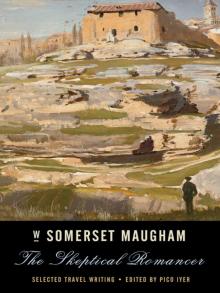 The Skeptical Romancer: Selected Travel Writing
The Skeptical Romancer: Selected Travel Writing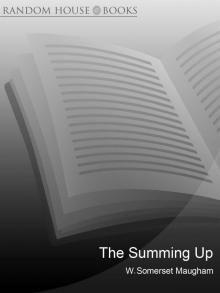 The Summing Up
The Summing Up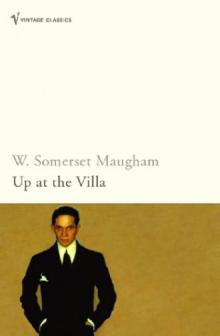 Up at the Villa
Up at the Villa The Razor's Edge
The Razor's Edge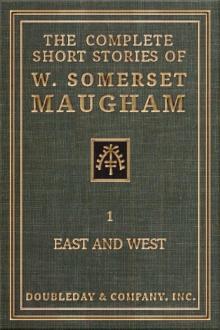 The Complete Short Stories of W. Somerset Maugham: East and West (Vol. 1 of 2))
The Complete Short Stories of W. Somerset Maugham: East and West (Vol. 1 of 2))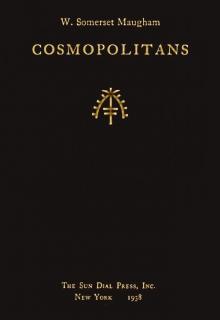 Cosmopolitans
Cosmopolitans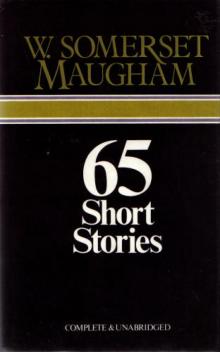 65 Short Stories
65 Short Stories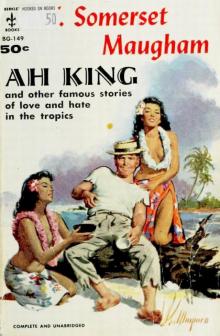 Ah King (Works of W. Somerset Maugham)
Ah King (Works of W. Somerset Maugham)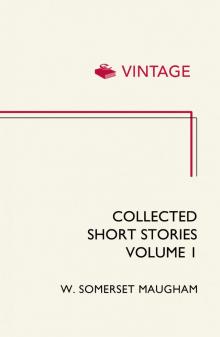 Collected Short Stories: Volume 1
Collected Short Stories: Volume 1 Collected Short Stories Volume 2
Collected Short Stories Volume 2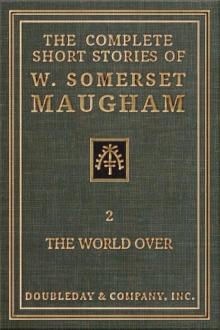 The Complete Short Stories of W. Somerset Maugham - II - The World Over
The Complete Short Stories of W. Somerset Maugham - II - The World Over Collected Short Stories Volume 4
Collected Short Stories Volume 4 Theatre
Theatre Short Stories
Short Stories Then and Now
Then and Now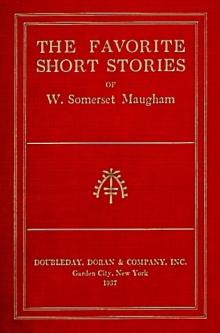 The Favorite Short Stories of W. Somerset Maugham
The Favorite Short Stories of W. Somerset Maugham Of Human Bondage
Of Human Bondage The Magician
The Magician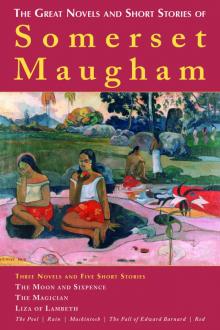 The Great Exotic Novels and Short Stories of Somerset Maugham
The Great Exotic Novels and Short Stories of Somerset Maugham A Writer's Notebook
A Writer's Notebook Christmas Holiday
Christmas Holiday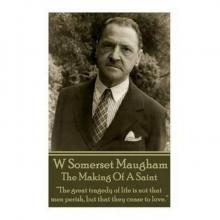 The Making of a Saint
The Making of a Saint Merry Go Round
Merry Go Round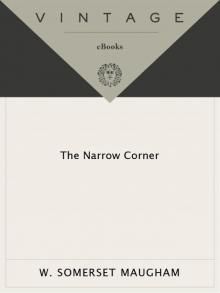 The Narrow Corner
The Narrow Corner Collected Short Stories Volume 3
Collected Short Stories Volume 3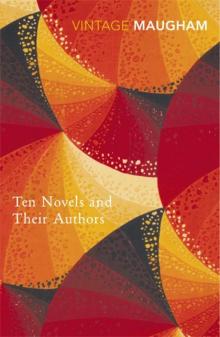 Ten Novels and Their Authors
Ten Novels and Their Authors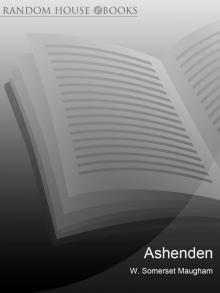 Ashenden
Ashenden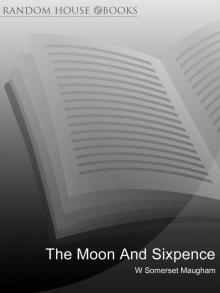 The Moon and Sixpence
The Moon and Sixpence Cakes and Ale
Cakes and Ale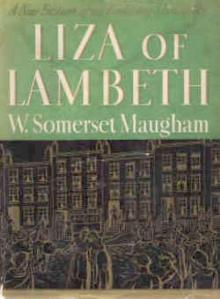 Liza of Lambeth
Liza of Lambeth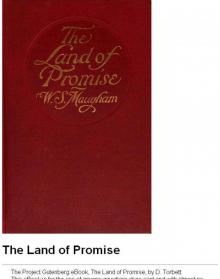 The Land of Promise: A Comedy in Four Acts (1922)
The Land of Promise: A Comedy in Four Acts (1922) A Writer's Notebook (Vintage International)
A Writer's Notebook (Vintage International)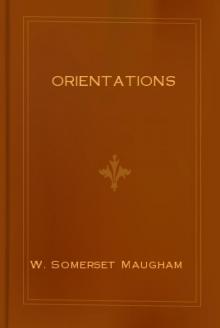 Orientations
Orientations Selected Masterpieces
Selected Masterpieces Mrs Craddock
Mrs Craddock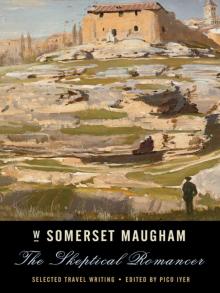 The Skeptical Romancer
The Skeptical Romancer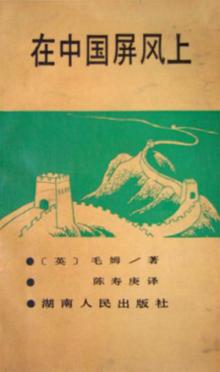 On a Chinese Screen
On a Chinese Screen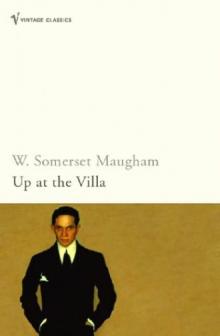 (1941) Up at the Villa
(1941) Up at the Villa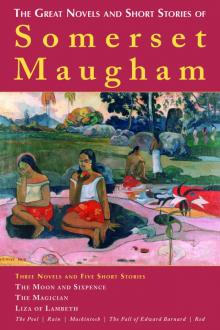 The Great Novels and Short Stories of Somerset Maugham
The Great Novels and Short Stories of Somerset Maugham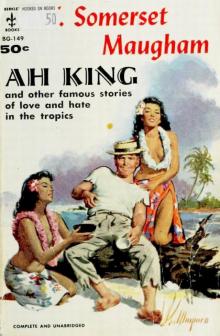 Ah King
Ah King The Explorer
The Explorer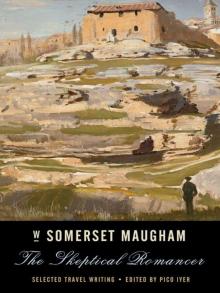 The Skeptical Romancer: Selected Travel Writing (Vintage Departures)
The Skeptical Romancer: Selected Travel Writing (Vintage Departures)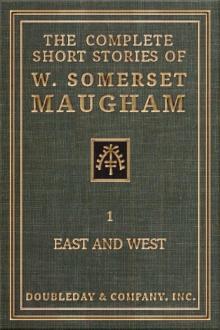 The Complete Short Stories of W. Somerset Maugham - I - East and West
The Complete Short Stories of W. Somerset Maugham - I - East and West